Karabakh War the graveyard of national governments; Will the pro-Western government of Pashinyan be overthrown?
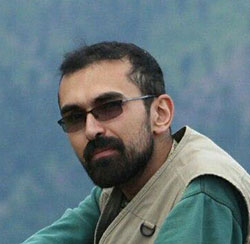
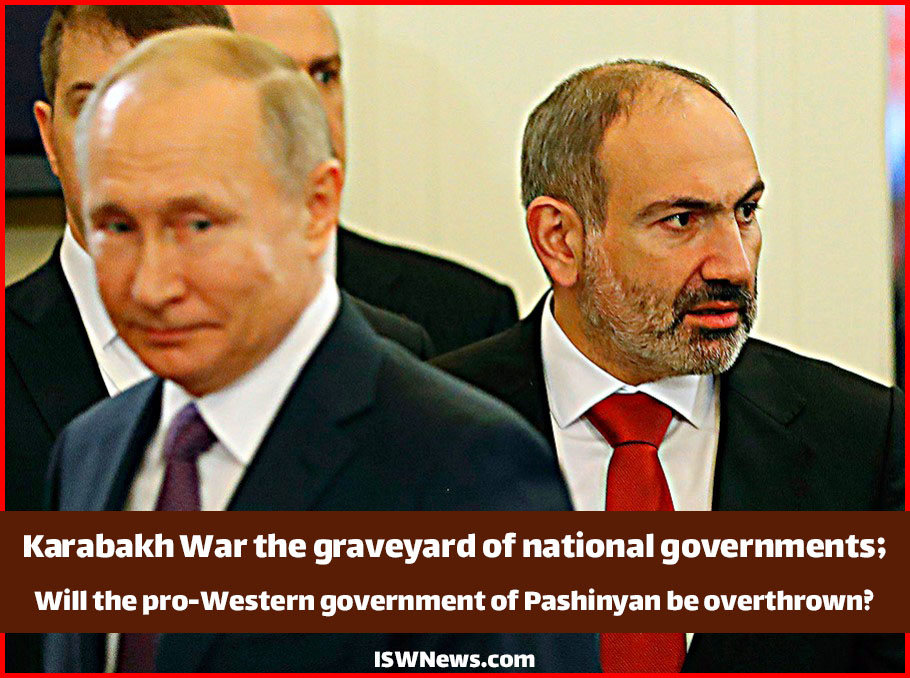
The political record of the Prime Minister of Armenia, Nikol Pashinyan, shows that he has entered politics from the world of journalism and has a history of opposition to the pro-Russian government in 2007 and a political prison in which he was pardoned in 2009. Pashinyan, who has been a member of parliament for the country since 2012, founded the “Civil Contract” party in 2015 and the “My Step Alliance” in 2018.
Relations between Azerbaijan and Armenia over the disputed region of Nagorno-Karabakh have been strained since the start of the war on September 27. According to Russian President Vladimir Putin, this bloody war has killed 5,000 people and has shown a different face of new battles. The Armenian army has lost airspace in the Nagorno-Karabakh region in the face of Israeli and Turkish drone strikes. Many attribute this to the deterioration of equipment and low-tech weapons and old anti-aircraft radars.
Of course, the country’s ground forces also leave their strongholds and retreat, leaving weapons, ammunition and equipment on the battlefield. Such behavior is very strange in a classic army. Usually, any experienced soldier destroys weapons, equipment and ammunition while retreating, which is less common in this war. Even the newly deployed forces of Armenia to Nagorno-Karabakh are facing a shortage of supplies and the logistics of Armenia are practically inoperable. Their border forces also withdrew along the border lines of the occupied territories with Iran without any special resistance.
The Armenians lost control of the Mataghis Dam (Sugovushan) and the Aras Dam, the cities of Fuzuli, Jibrayil, Hadrut, Zangilan and Qubadli, and Azerbaijan reached the international border of Armenia along the Aras River. Even the Armenian Defense Minister admits to successive defeats. The display of the destroyed and looted equipment of the Armenian army and the capture of the Armenian forces by the Azerbaijani coalition have also greatly lowered the morale of the Armenian forces. However, the resistance of the defense forces of the Nagorno-Karabakh region during the recent battles has been far greater than that of the Armenian army, which is also very strange.
Many have so far cited the power of the coalition forces of Azerbaijan, Turkey, Pakistani Army Special Forces, Syrian and Caucasian terrorists as the main reason for the superiority on the battlefields with the Armenian forces.
But why have the Armenian Armed Forces done so little over the past month except to retreat and counter-attack?
Although the Armenians are positioned in the highlands, they do not make good use of this advantage, and Azerbaijani forces have reached the vicinity of Shusha and the Lachin crossing, which threatens the most important communication corridor between Armenia and Nagorno-Karabakh.
Air and artillery strikes inside Armenia have also destroyed some military equipment inside the country. The Prime Minister of Armenia has asked the Russian Federation for help in concluding a defense and military pact, which has been met with a cold reaction from the President of the Russian Federation, Vladimir Putin.
Putin has stated that he is willing to intervene militarily in favor of Armenia only if Armenian territory is attacked, which shows a clear difference of position with the history of the Russians in the first Nagorno-Karabakh War.
However, Russia, with its military base in Gyumri, could thwart all efforts by hostile forces with its air force and air defense in the area.
Iran has also closed the Norduz border terminal on the border between East Azerbaijan Province and Armenia, and some believe this is due to internal pressures from pro-Azerbaijani rallies in Azeri cities. In any case, Iran’s move to suspend economic relations with Armenia has caused more economic problems for Armenia, as Georgia’s borders with Armenia have been closed and the situation in Armenia is deteriorating.
In addition to the above, the Prime Minister of Armenia dismissed the Border Command of the country due to the shooting in “ceasefire conditions” from inside Armenia to Azerbaijani forces on the Aras border and the reciprocal response of Azerbaijani forces. Although Azerbaijan denies any response to the fire of the Armenian side, the fire of both sides is undeniable. Also, the three-time violation of the ceasefire during the war, which both sides accuse each other of, is not something that can be considered the will of the political parties.
If we study the history of the armed forces of the countries that inherited the former Soviet Union, we come across strong relations between the armed forces of these countries and Russia, which raises the issue of influence in the military forces of these republics.
It is not yet clear whether the Russian elements are violating the ceasefire, but there are hands on the Armenian side that are leading the way to military defeat, political instability and protest. Armenia’s political atmosphere is against Prime Minister Pashinyan, who effectively controls the government and the commander of the country’s military. A number of political activists and the media have criticized his actions in the Nagorno-Karabakh conflict.
But why should such a thing happen in Armenia during a war?
The political record of the Prime Minister of Armenia Nikol Pashinyan shows that he has entered the field of politics from the world of journalism (editor of Haykakan Zhamanak newspaper) and has a history of opposition to the pro-Russian government in 2007 and political imprisonment, which was pardoned in 2009. Pashinyan, who has been a member of parliament for the country since 2012, founded the “Civil Contract” party in 2015 and the “My Step Alliance” in 2018.
He was the main protester against the results of the 2018 National Assembly elections and the victory of Serzh Sargsyan, the Former President and (pro-Russian) Republican Candidate, and called the election results fraudulent.
Pashinyan was able to organize a wave of opposition against Sargsyan by marching from the city of Gyumri to Yerevan, and Sargsyan resigned as prime minister on April 23. Pashinyan became prime minister on May 8 of that year by a majority vote. But his promises to solve the challenges of previous periods without a proper solution not only failed, but also led to popular protests and opposition before the Karabakh war.
The distinguishing feature of Pashinyan in this period can be called the greater Westernization and diminishing of Russia’s political and economic role in Armenia. Attending NATO military exercises, establishing economic ties with the European Union instead of Russia, and making controversial remarks about the Gyumri base have been hot topics during his tenure. The Pashinyan government’s determination to join the North Atlantic Treaty Organization (NATO) also exacerbates Iran’s concerns, which is against the national interests of Iran.
Opposition initiative
During a meeting with the Prime Minister, Robert Kocharyan andSerzh Sargsyan proposed his resignation in order to find a way out of the crisis, and it is not unlikely that if the prime minister refuses, the option of a march and a military coup to save the country from military defeat in the Nagorno-Karabakh war will happen, which in the current situation will be accepted by the majority of the country’s society.
It can be argued that the recent war has provided the greatest opportunity for Russian supporters in Armenia to oust the Pashinyan under the pretext of inefficiency and military defeat, and to end the work of the pro-Westerners in this country.
Of course, Pashinyan, as a journalist, has not learned a lesson from the history of the Nagorno-Karabakh war. A similar scenario was planned in 1992 for Azerbaijani President Ayaz Mutalibov, in which the militants of the Azerbaijani Popular Front (supporters of Abulfaz Elchibey) evacuated the Lachin and Shusha fronts against the invasion of the Armenian army and after the Khojaly tragedy, these militants ended the life of the government with the presence of several thousand forces in Baku and in front of the Presidential Palace.
However, the next government of Azerbaijan did not last long, and the military defeats combined with the economic crisis and the political coup of Heydar Aliyev, which had the political support of Iran, led to the collapse of the “Abulfaz Elchibey” government and the political and military elements of the “Abulfaz Elchibey” government were dismissed and imprisoned as the cause of Azerbaijan’s defeats.
Such a possible change could change the course of the recent war, and Armenia, with the support of the Russians, this time will show a new face with a new strategy that will not be pleasant for the Azerbaijani coalition at all. This unhappiness starts from the fact that the Azerbaijani coalition, like a gambler, has put all its cards on the table and its military strategy has been known over the past month. The air superiority under the flight of drones, heavy shelling, infiltration of commando groups behind the opponent’s front and then armored and infantry attacks of Azerbaijan is a strategy that has nothing to hide.

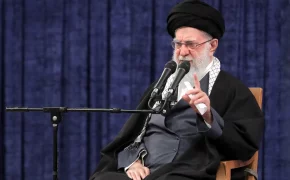
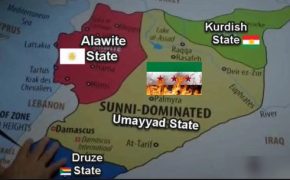
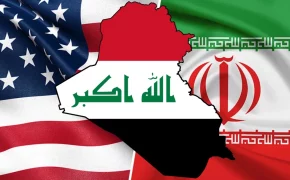
Comment